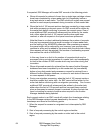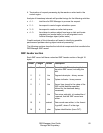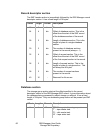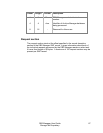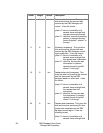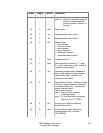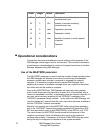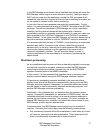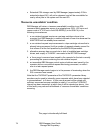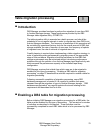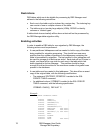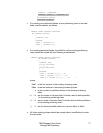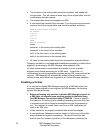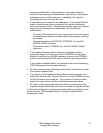72 DB2 Manager User Guide
StorageTek Proprietary
Rejection of a request due to the MAXQLEN value having been reached or
due to the TAPEWAIT interval having been exceeded will generate an SQL –
652 error with a reason code of X'1015' in field SQLERRD(6) in the SQLCA.
Use of the MAXDRDR parameter
The MAXDRDR parameter is used to control the number of disk reader tasks
which are active in the DB2 Manager control region. A disk reader task is
used to perform retrieval of a migrated row from an Archive Manager
database when a disk (‘K’) copy exists of the object containing the row.
If the value of MAXDRDR is greater than 1, DB2 Manager will assign a new
disk object retrieval request to the disk reader task with the shortest request
queue. In this way, the length of the request queues will be balanced across
the allocated disk reader tasks. Increasing the value of MAXDRDR will
decrease the average disk reader task request queue length. However, there
will be a corresponding increase in the amount of virtual storage required by
the DB2 Manager control region. For most operational environments, the
default MAXDRDR value of 4 will be sufficient.
If the value of MAXDRDR is 0, then all object retrieval requests, whether
objects have a disk copy or not, will be processed by the tape reader tasks
currently allocated in the control region. Each tape reader task will issue a
standard Archive Manager object retrieval request; if a disk copy of an object
exists then Archive Manager will satisfy the retrieval request from disk (i.e.
the object will still be retrieved from disk, even though it is being processed
by a tape reader task). Setting the MAXDRDR value to 0 is not
recommended in these circumstances, as it may cause disk object retrievals
to be rejected unnecessarily if there are no available tape reader tasks to
process the request.
If an error occurs when Archive Manager attempts to retrieve the disk copy of
an object, Archive Manager will automatically re-drive the retrieval attempt
from tape. In these circumstances it is possible that a disk reader task will
attempt to process a tape dataset. This may cause contention for tape drives,
resulting in failure of the retrieval request, if all available drives are currently
being processed by the tape reader tasks. Retrieval of the tape copy of an
object by a disk reader task will not impact the ability of that task to continue
accepting and processing further disk object retrieval requests.
Allocation recovery
Allocation recovery occurs on MVS systems when there are no tape drives
available to satisfy an allocation request. In this case, the following message
will be output by the system:
IEF238D jjj - REPLY DEVICE NAME, 'WAIT' OR 'CANCEL'
Normal practice is for an operator (or automated operator facility) to reply
WAIT to this request. The job requiring the allocation will then wait until a
drive becomes available before being able to continue.



